The world of tattoo artistry is as diverse and vibrant as the individuals who choose to adorn their bodies with ink. Among the multitude of captivating designs, the fallen angel tattoo holds a unique allure for many. This article will delve into the depths of the fallen angel tattoo meaning, exploring its symbolism, interpretations, and the reasons behind its popularity. If you’re curious about this intriguing design and its significance, read on to discover the hidden stories etched upon the skin.
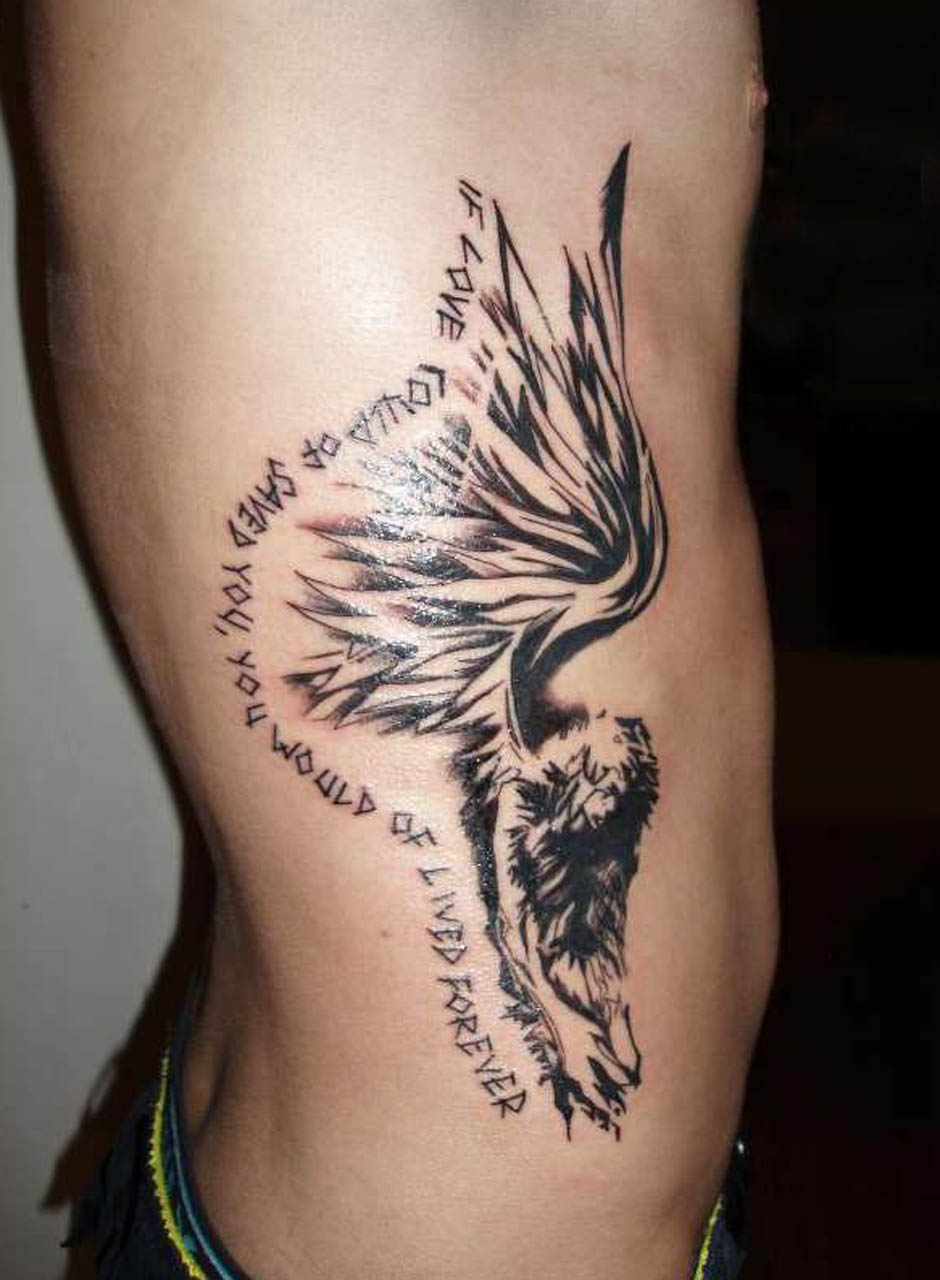
The Enigmatic Appeal of Fallen Angel Tattoos
What Makes Fallen Angel Tattoos So Intriguing?
Fallen angel tattoos hold a unique and captivating allure for individuals who seek both beauty and complexity in their body art. These tattoos feature the imagery of celestial beings who have descended from grace, representing a powerful contrast between heavenly elegance and melancholic darkness. This juxtaposition of opposing elements creates an intriguing visual appeal that resonates with those who appreciate the intricate complexities of the human experience.
The symbolism behind fallen angel tattoos goes beyond mere aesthetics. It embodies the eternal struggle between good and evil, light and shadow, which is a fundamental part of human existence. The fallen angel represents a being who was once associated with divine purity and righteousness but has succumbed to temptation or rebellion, resulting in their fall from grace. This narrative of inner conflict and moral ambiguity holds significant meaning for many individuals who find solace in expressing their own personal battles through their body art.
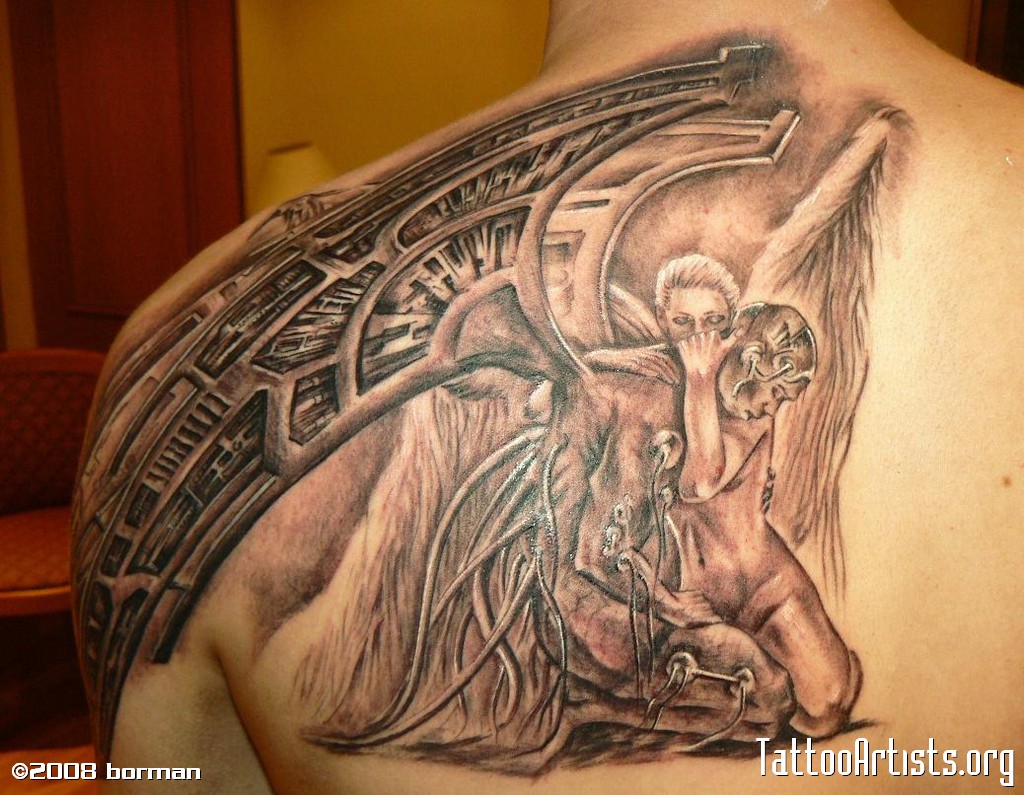
By choosing a fallen angel tattoo, one embraces the duality that resides within each person and acknowledges the constant tug-of-war between contrasting forces present in life. It serves as a reminder that no individual is entirely good or evil, and that everyone possesses both bright and dark aspects within themselves. This recognition of inherent complexity can be empowering, as it encourages self-reflection and acceptance of the multifaceted nature of humanity.
Moreover, fallen angel tattoos often convey a sense of melancholy and introspection. They evoke a feeling of longing or nostalgia for lost innocence or past mistakes, reflecting on the consequences of one’s choices and the inevitable imperfections of human existence. This emotional depth and introspective quality make fallen angel tattoos particularly appealing to those who appreciate art as a means of exploring the depths of their soul and expressing their emotions.
In terms of artistic design, fallen angel tattoos offer endless possibilities for creativity and customization. From intricate wings with delicate feathers to dark, brooding backgrounds, artists can incorporate various elements to enhance the symbolic meaning of the tattoo. The level of detail and complexity in these tattoos allows individuals to create a truly unique and personal piece of art that embodies their individual journey and perspective.
Embracing Dualities: The Yin and Yang of Fallen Angel Tattoos
Fallen angel tattoos hold significant symbolism within the realm of body art. These captivating designs encapsulate the essence of dualities, harmoniously merging opposing elements to create a visually striking representation. By combining delicate beauty with fierce rebellion, purity with corruption, and vulnerability with strength, these tattoos evoke a profound sense of introspection and contemplation.
The concept of fallen angels originates from various religious and mythological traditions. In Judeo-Christian belief systems, fallen angels are heavenly beings who have rebelled against God and been cast out of Heaven. They embody the complex interplay between good and evil, representing the potential for both virtue and vice within us all. Fallen angel tattoos capture this intricate balance, serving as a reminder that even the most ethereal beings can succumb to darkness or be influenced by negative forces.
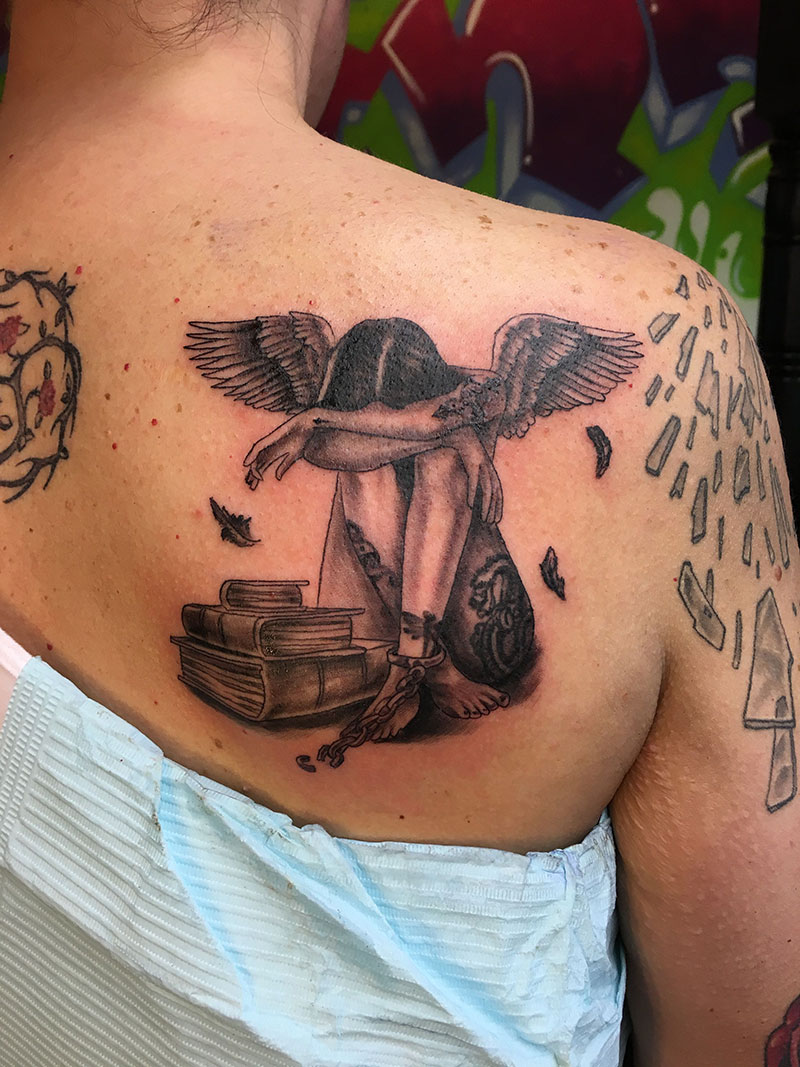
One of the captivating qualities of fallen angel tattoos is their ability to seamlessly blend delicacy and beauty with an underlying rebellious nature. The image of an angel, traditionally associated with purity and grace, takes on a newfound edge when depicted as fallen. This juxtaposition creates a visually compelling contrast, symbolizing the conflict between societal norms and individual autonomy. It reflects the human desire to break free from constraints and embrace one’s true nature, even if it means challenging established paradigms.
In addition to embodying rebellion, fallen angel tattoos also represent the inherent duality within human nature. They remind us that purity can exist alongside corruption, highlighting the potential for both virtue and sin within every individual. These tattoos serve as a reflection of the complex human experience, acknowledging our capacity for both noble acts and flawed decisions. They encourage us to confront our own shadows and embrace the full range of our emotions and experiences in order to find personal growth and redemption.
Furthermore, fallen angel tattoos convey a sense of vulnerability intertwined with strength. They symbolize the inherent fragility of existence but also showcase resilience and fortitude in the face of adversity. By portraying angels as fallen, these tattoos evoke empathy and compassion for those who have experienced downfall or struggle. They serve as a reminder that even in our darkest moments, there is potential for transformation and redemption. Fallen angel tattoos encourage individuals to embrace their vulnerabilities, recognize their inner strength, and find solace in the possibility of renewal.
The Mythological Origins of Fallen Angels
The fallen angel tattoos hold a profound and intricate meaning that can be fully understood by delving into their mythological origins. These tattoos embody the concept of fallen angels, which are present in diverse cultures and belief systems worldwide. Fallen angels are symbolic representations of celestial beings who have either revolted against heaven or willingly relinquished their divine nature.
One of the most well-known fallen angels is Lucifer, the central figure in Christian tradition. According to the Bible, Lucifer was an archangel who rebelled against God’s authority, leading to his expulsion from heaven. The story of Lucifer serves as a cautionary tale about pride, disobedience, and the consequences of challenging divine order. In this context, fallen angel tattoos can be seen as a reflection of defiance, rebellion, or the rejection of societal norms.
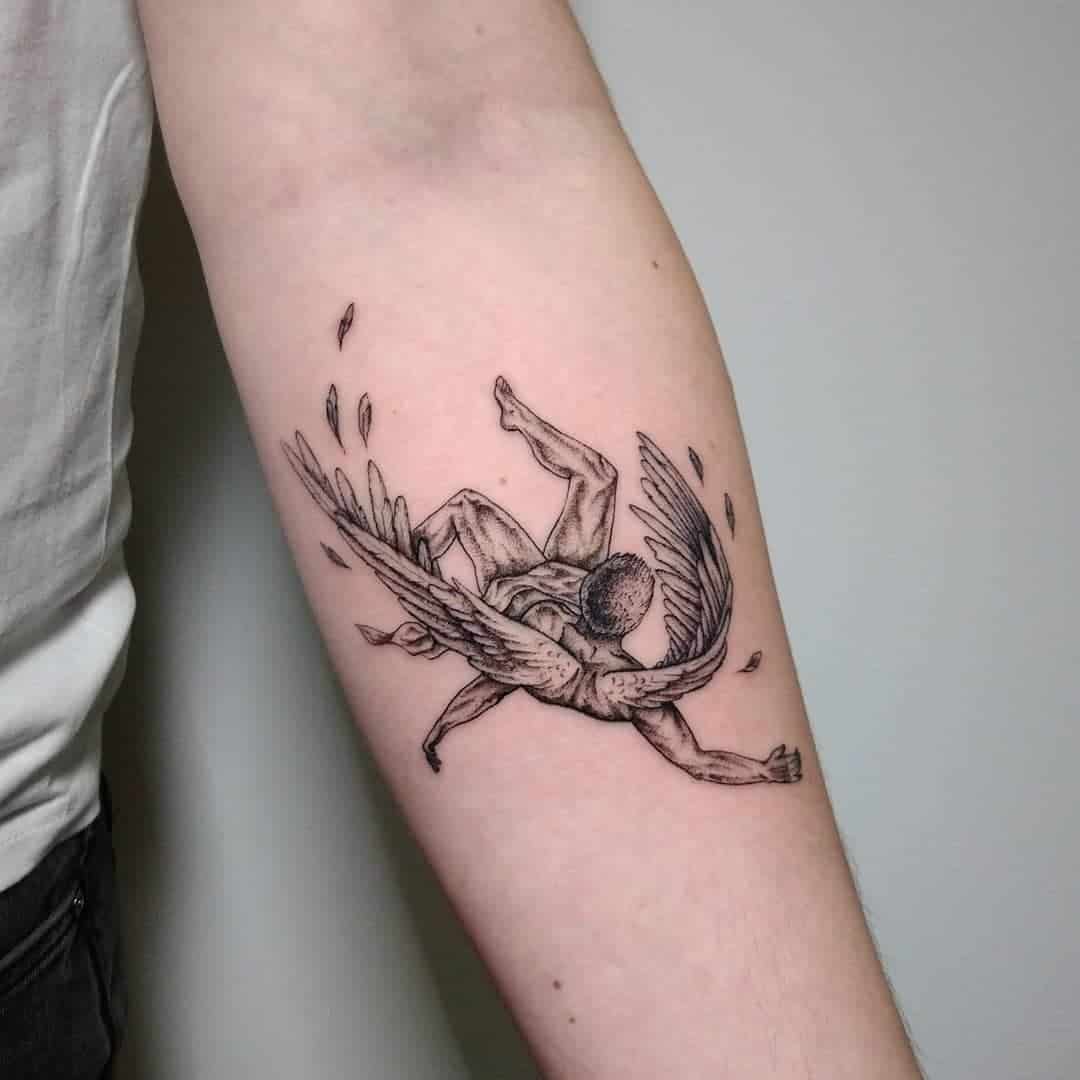
Beyond Christianity, fallen angel imagery can be traced back to ancient mythologies. In Greek mythology, for example, the Titans were deities who ruled before the Olympian gods. However, they eventually rebelled against their parents, the primordial deities known as the Titans, resulting in a cosmic war that led to their downfall. This mythological narrative resonates with the concept of fallen angels as powerful divine beings who have succumbed to their own desires or challenged the established divine hierarchy.
Similarly, Norse mythology features stories of fallen gods. Loki, a trickster deity associated with chaos and mischief, could be considered a fallen god due to his inclination towards disruptive actions and his eventual betrayal of the gods during Ragnarok, the apocalyptic battle. These tales contribute to the diverse range of interpretations surrounding fallen angels and further enrich the symbolism associated with them.
What is the fallen angel tattoo meaning?
Rebellion and Independence: A Defiant Statement
The fallen angel tattoo is a powerful symbol that embodies the essence of rebellion and independence. It serves as a visual manifestation of the wearer’s desire to break free from societal constraints, challenge norms, and embrace their own individuality. This tattoo design holds deep meaning for those who choose to adorn their bodies with it, representing a bold expression of their refusal to conform to conventional standards.
The concept of a fallen angel carries a sense of defiance and nonconformity. In many religious and cultural contexts, angels are often depicted as beings of purity, obedience, and servitude. However, a fallen angel represents a deviation from this perceived ideal. It symbolizes a character who has rebelled against authority, defied expectations, and chosen to follow their own path.
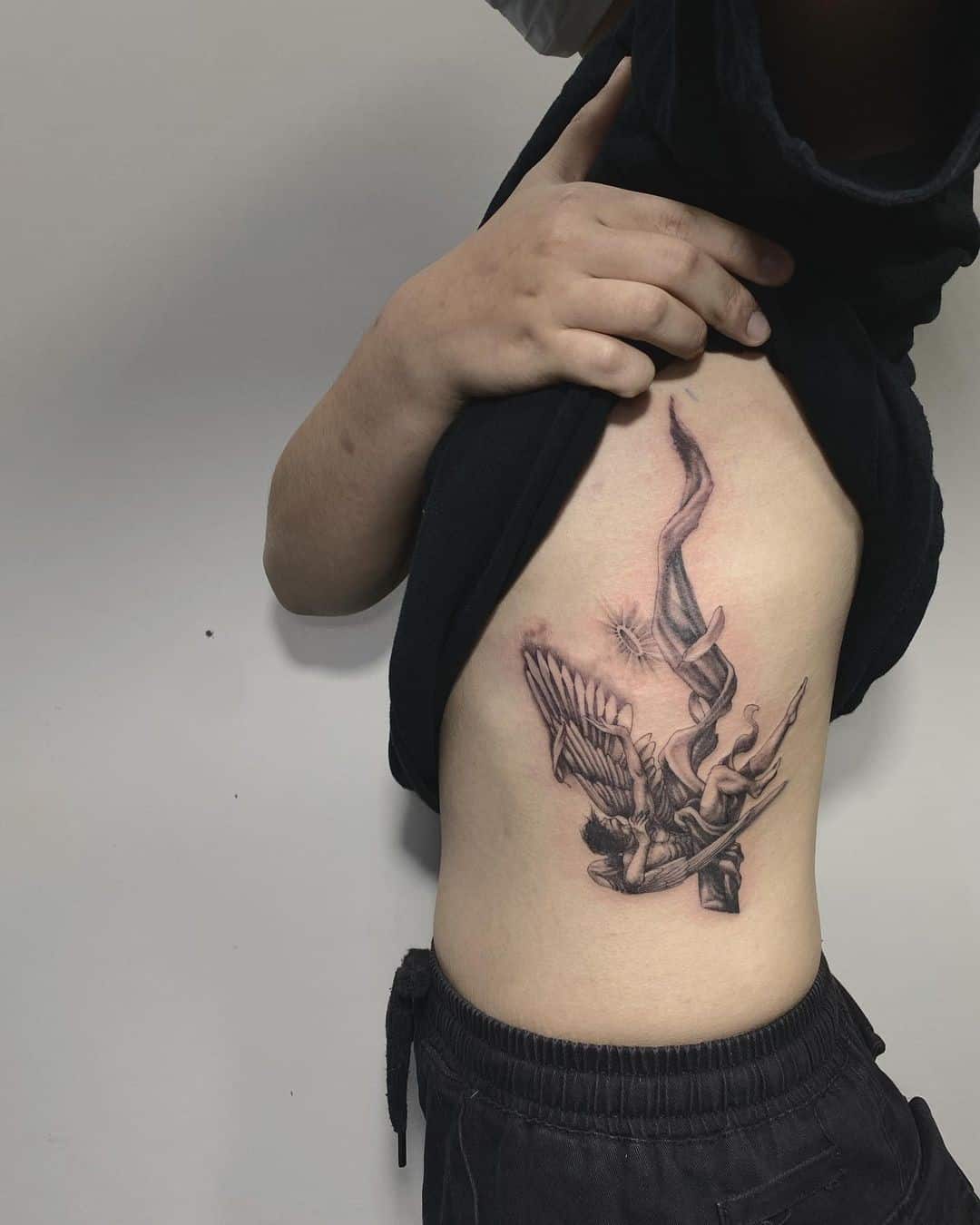
By choosing to ink a fallen angel onto their skin, individuals make a deliberate statement about their rejection of societal norms and conventions. It signifies their willingness to challenge established beliefs, traditions, and limitations imposed by others. This tattoo becomes a constant reminder of their determination to live life on their own terms, unafraid to stand apart from the crowd.
Moreover, the fallen angel tattoo also conveys an innate sense of strength and resilience. The image of a fallen angel typically portrays an angelic figure with broken or tattered wings, suggesting a loss of innocence or a departure from grace. This symbolism resonates with individuals who have experienced hardships, personal struggles, or moments of rebellion in their lives. It serves as a reminder that even in challenging times, one can rise above adversity and find their own unique path towards self-discovery and fulfillment.
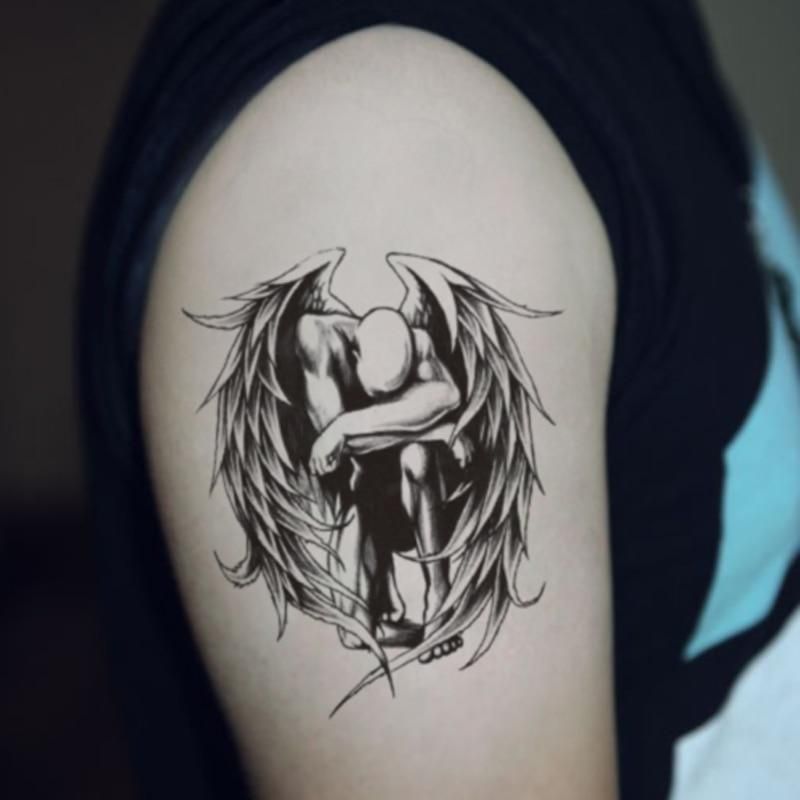
The act of permanently marking one’s body with the fallen angel design represents a commitment to living authentically and embracing individuality. Tattooing is a deeply personal and transformative experience for many, allowing them to reclaim ownership of their bodies and assert their identities. By choosing such a rebellious and thought-provoking symbol, wearers make a bold statement about their refusal to conform to societal expectations and their unwavering dedication to charting their own course.
Struggling with Inner Demons: A Battle for Redemption
A fallen angel tattoo is a powerful symbol that carries deep meaning and represents a profound personal journey. It embodies the struggle to overcome inner demons and find redemption in the face of adversity. Such a tattoo serves as a constant reminder of the ongoing battle one faces in their quest for self-improvement and spiritual growth.
The concept of a fallen angel originates from various religious and mythological traditions where angels, typically associated with purity and divine grace, are depicted as having fallen from grace due to rebellion or disobedience. In popular culture, fallen angels are often portrayed as tragic figures caught between darkness and light, embodying both the potential for evil and the longing for salvation.
When someone chooses to get a fallen angel tattoo, it signifies their acknowledgment of their own personal struggles and imperfections. The tattoo becomes a visual representation of the wearer’s determination to confront their inner demons and rise above them. It symbolizes the constant battle they engage in to transform themselves into better individuals.
The fallen angel tattoo also conveys the message that even in our darkest moments, there is always a glimmer of hope. While the fallen angel represents the struggle and darkness, it simultaneously reminds us that within that struggle lies the potential for growth and change. It serves as a poignant reminder that despite the hardships we face, redemption and transformation are always within our reach.
The tattoo can be designed in various ways, allowing for individual expression and customization. Some may choose to depict the fallen angel with tattered wings or a sorrowful expression, representing the weight of their past actions or emotional burdens. Others may incorporate elements such as rays of light, flames, or blooming flowers to emphasize the theme of transformation and the possibility of finding solace amidst the darkness.
Beauty in Imperfection: Embracing Flaws
In a society that frequently idolizes flawlessness and perfection, fallen angel tattoos offer a refreshing deviation by celebrating the inherent beauty found in imperfections. These tattoo designs encapsulate the profound idea that flaws and scars play an integral role in shaping our individuality and fortitude. By embracing the fallen angel motif, individuals willingly acknowledge their own vulnerabilities and discover solace in the liberating acceptance of their authentic selves.
The world often imposes unrealistic standards of beauty and success, making it easy to feel inadequate or imperfect. People are bombarded with images of airbrushed models, polished celebrities, and an idealized version of life that seems unattainable. However, through fallen angel tattoos, individuals can find empowerment in their unique journey and personal experiences. These tattoos serve as reminders that no one is perfect, and it is through our imperfections that we become truly remarkable.
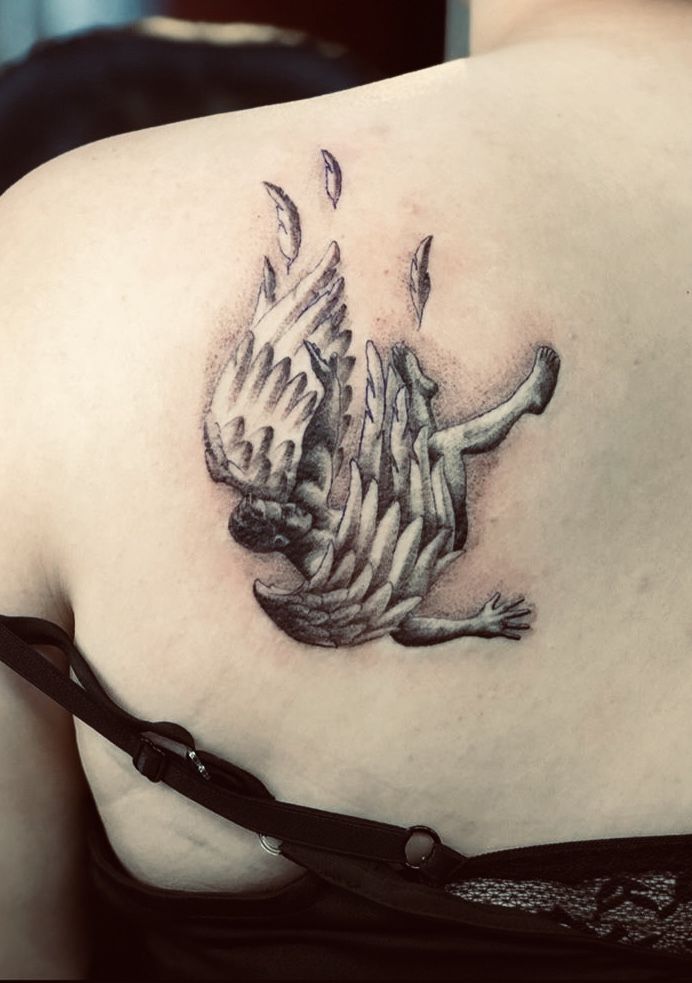
Fallen angel tattoos symbolize resilience and strength in the face of adversity. They represent the inner turmoil and struggles that everyone faces throughout their lives. Just like angels who have fallen from grace, these tattoos imply that even in the midst of hardship, there is room for growth and redemption. The scars we bear, both physical and emotional, become testaments to our ability to endure, heal, and rise above challenges.
By choosing to adorn their bodies with fallen angel tattoos, individuals actively reject society’s relentless pursuit of perfection. They embrace their flaws and scars as essential parts of their identity, refusing to hide or be defined by them negatively. Instead, they transform their perceived weaknesses into sources of strength and resilience. In doing so, they tap into an inner wellspring of self-acceptance and self-love.
Fallen angel tattoos encourage people to cultivate a deep sense of authenticity and vulnerability. They remind us to embrace our true selves, including the aspects that may make us feel flawed or imperfect. By publicly displaying these tattoos, individuals demonstrate their willingness to be seen and accepted as they are, with all their unique quirks, scars, and imperfections. In a world that often promotes conformity, fallen angel tattoos serve as powerful symbols of individuality and self-expression.
Mourning Lost Innocence: A Reflection on Loss
Fallen angel tattoos hold a deep and multifaceted symbolism, often representing mourning and loss. They convey a profound sense of grief and sadness for the innocence that has been lost or the dreams left unfulfilled. These tattoos serve as poignant memorials, allowing individuals to carry cherished memories and honor those who have departed.
The concept of fallen angels originates from various religious and mythological traditions, where angels who rebelled against God or fell from grace are depicted as having lost their divine status. In this context, fallen angels symbolize the tragic downfall and loss of purity. By incorporating this imagery into a tattoo design, individuals can express their sorrow and longing for something or someone they have lost.
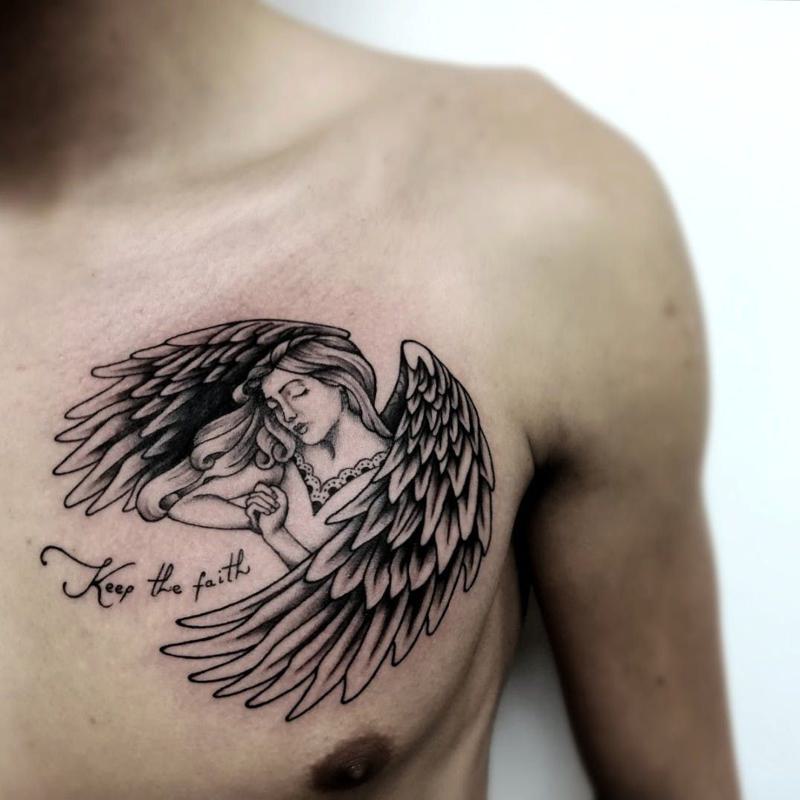
These tattoos can be deeply personal and cathartic, providing a means for individuals to cope with their grief and find solace in remembering their loved ones. They act as a constant reminder of the precious moments shared, serving as a source of comfort during times of mourning.
The fallen angel motif also embodies a bittersweet beauty. The juxtaposition of angelic features with a somber or melancholic demeanor creates a visually striking representation of the paradoxical nature of loss. Through these tattoos, individuals can capture the complex emotions that accompany mourning, encompassing both sorrow and reverence.
Moreover, fallen angel tattoos allow individuals to celebrate the lives of those they have lost. They provide a way to immortalize the memory of departed loved ones, ensuring that their impact on one’s life is never forgotten. By permanently etching the image of a fallen angel onto their skin, individuals can carry a tangible connection to the past and pay homage to those who have passed away.
In addition to being symbols of mourning and remembrance, fallen angel tattoos can also represent personal struggles and resilience. They can serve as a reminder of overcoming adversity, emerging stronger from difficult experiences, or navigating through challenging periods in life.
Resilience and Rebirth: Rising From the Ashes
The fallen angel tattoo is a powerful symbol that signifies resilience and rebirth. It embodies the notion that even in the depths of darkness, one can rise above and find redemption. Those who choose to adorn themselves with this tattoo express their unwavering determination to overcome adversity and emerge stronger than ever.
The concept behind the fallen angel tattoo revolves around the idea that life’s challenges and hardships are not insurmountable obstacles but rather opportunities for personal growth. Just as a fallen angel regains its wings and ascends from the shadows, individuals with this tattoo embrace their ability to transform and triumph over difficult circumstances.
By wearing the fallen angel symbol permanently on their skin, individuals seek to embody the spirit of perseverance and tenacity. It serves as a constant reminder that setbacks and failures do not define them; instead, they serve as catalysts for personal development and an invitation to rise above difficulties.
This tattoo design represents the transformative power inherent in every individual. It encourages those who bear it to confront their inner demons, confront past mistakes or traumas, and find redemption within themselves. The fallen angel tattoo becomes a visual representation of the wearer’s journey through darkness, ultimately leading to self-discovery and a renewed sense of purpose.
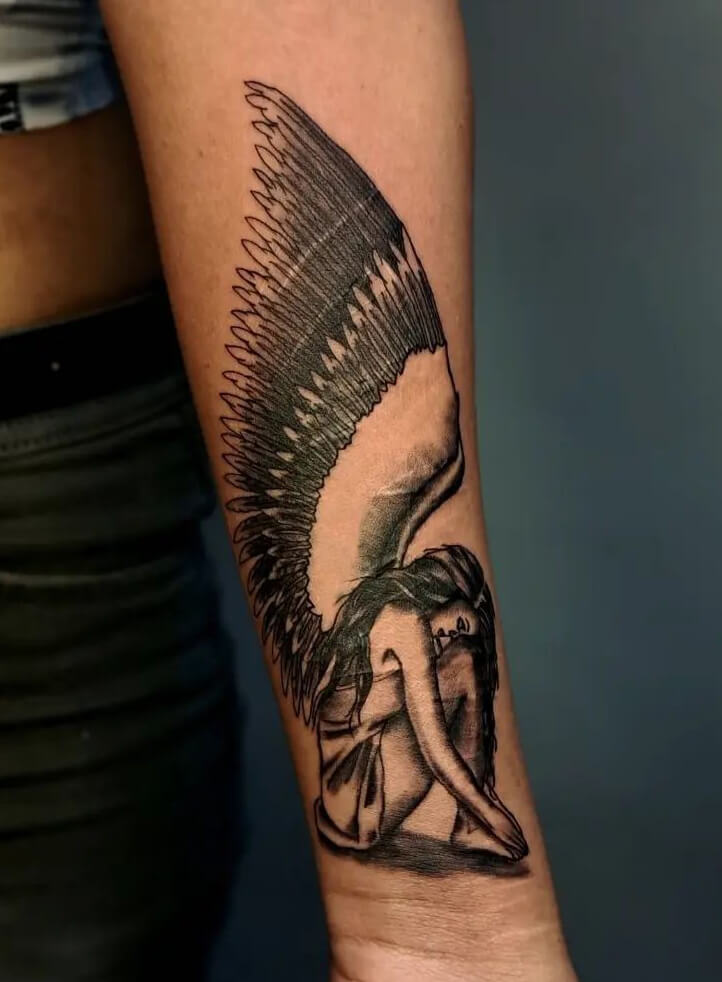
Moreover, the fallen angel tattoo can also serve as a source of inspiration for others. By openly displaying their ink, individuals with this symbol demonstrate their willingness to share their experiences and provide hope to those facing similar struggles. It becomes a conversation starter, allowing them to share stories of resilience and encourage others to persevere in the face of adversity.
In essence, the fallen angel tattoo encapsulates the profound message of resilience and rebirth. It signifies the indomitable human spirit and the capacity to overcome any challenge. Those who choose to bear this symbol on their bodies acknowledge the transformative power of perseverance and serve as a living testament to the potential for personal growth. It conveys a message of hope and inspires both the wearer and those who encounter it to embrace the journey of self-discovery, triumph over darkness, and emerge stronger than ever before.
The History and Cultural Significance of the fallen angel tattoo
Unearthing the Origins of Fallen Angel Symbolism
The symbolism of fallen angels transcends time and cultural boundaries. Let’s delve into the historical context and cultural significance of fallen angel tattoos.
Ancient Mythologies: Mesopotamia to Greece
The concept of fallen angels can be traced back to ancient civilizations such as Mesopotamia and Greece. In Mesopotamian mythology, the story of the fallen angel known as “Lilith” emerged, representing independence and rebellion. In Greek mythology, the fall of Icarus, who flew too close to the sun with wax wings, symbolizes the consequences of arrogance and hubris.
Religious Texts: Christianity and Beyond
In Christianity, fallen angels are described as demons who followed Lucifer, the once-beloved angel who rebelled against God. This biblical narrative has permeated Western culture, influencing artistic representations and inspiring countless interpretations of fallen angels in various art forms, including tattoos.
Outside of Christianity, similar narratives of fallen or rebellious celestial beings can be found in other religious traditions, such as Islamic and Jewish texts. These stories reflect the universal fascination with the themes of duality, redemption, and the struggle between good and evil.
Contemporary Culture: Popularity in Modern Tattoos
Today, fallen angel tattoos have gained immense popularity in contemporary tattoo culture. They have become a powerful symbol of personal expression, capturing the attention of tattoo enthusiasts from all walks of life. The flexibility of fallen angel tattoo designs allows individuals to infuse their unique narratives and interpretations, making them highly sought-after by those seeking meaningful and visually striking body art.
Conclusion
In the realm of tattoo artistry, fallen angel tattoos stand out as captivating symbols of duality, rebellion, and personal growth. These intricate designs hold deep meaning for those who choose to adorn their bodies with them, embodying the struggle between light and darkness, innocence and corruption. Whether seeking to express independence, mourn lost innocence, or embrace imperfections, a fallen angel tattoo serves as a constant reminder of the complexities inherent in the human experience.
As you embark on your own journey into the world of fallen angel tattoos, remember that its meaning is deeply personal and open to interpretation. Consult with a talented tattoo artist who can bring your vision to life and guide you through the process. Cherish the art etched upon your skin, knowing that it represents not only a stunning visual display but also a profound reflection of your own unique story.

I am Harvey Berry, a tattoo enthusiast who has immersed himself in the diverse world of ink, passionately exploring the beauty and artistry within each tattoo. My mission extends beyond uncovering the aesthetics of tattooing; it involves sharing in-depth knowledge across all aspects of this art form.
Fueled by genuine curiosity and love for every facet of tattooing, I have diligently crafted well-researched articles, with a special focus on the Tattoo Meaning of Impeccable Nest section. Here, my aim is to help the tattoo community gain a deeper understanding of the meanings and values embedded in each tattoo.
One of my primary goals is to encourage responsible decision-making when it comes to getting inked. I recognize that choosing to get a tattoo is a significant personal decision that requires careful consideration. Hence, I provide diverse resources covering the meaning of tattoos, the tattooing process, aftercare tips, and other valuable information.
Whether you are a seasoned tattoo enthusiast or embarking on your first exploration of the world of body art, I aspire to be a reliable resource for you at every step of your journey. I hope that my extensive knowledge of tattoos, especially in the Tattoo Meaning section, will assist you in finding inspiration to express yourself through the art of tattoos.
